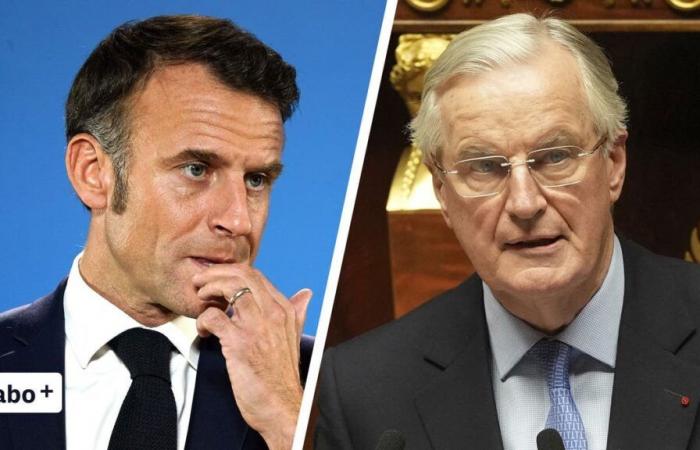France’s government overthrown: This vote goes to President Macron
The French National Assembly has voted no confidence in Prime Minister Michel Barnier. This first fall of the government since 1962 is forcing President Macron to act. But he is increasingly losing political control.
He was voted out of government: French President Emmanuel Macron (right) in front of Prime Minister Michel Barnier.
Bild: Ludovic Marin / AP
It was a final, dramatic appeal to MPs: they should think about the nation’s overarching interest, Michel Barnier said on the main television channels. “The situation is serious,” exclaimed the conservative head of government. “We have to be careful because there are strong tensions in the country.”
The majority of the National Assembly had a different opinion on Wednesday evening: Parliament expressed no confidence in Barnier with 331 votes (out of 577 seats) on the issue of the 2025 social budget. The proposal came from the New Left Front made up of socialists, greens, communists and “indomitables”; Marine Le Pen’s right-wing Rassemblement National (RN) joined.
The conservative prime minister must now submit his resignation to the president. Macron, currently on a state visit to Saudi Arabia, is not bound to a deadline for a new appointment. He could also entrust Barnier with forming a new government. According to insiders, he is only checking new names.
Voted out: Prime Minister Michel Barnier.
Build: Yoan Valat / EPA
We are talking about Interior Minister Bruno Retailleau, Defense Minister Sébastien Lecornu and the center democrat François Bayrou. It would also be possible to set up a government of experts, as Italy did for a while with Mario Draghi.
The institutional problem would remain in any case: the three blocs that emerged from this summer’s new elections – the right-wing RN, the Macron center and the left-wing Popular Front – are not in a position to form a majority government on their own. Macron’s former Prime Minister Gabriel Attal therefore proposed a kind of standstill agreement between moderate parties from the Conservatives to the Socialists on Wednesday. This is intended to prevent another fall of the government by the far right and left.
The crisis becomes permanent
But the socialists only want to play along if Macron appoints a left-wing prime minister – be it a moderate social democrat like Bernard Cazeneuve or the decidedly left-wing top official Lucie Castets. In that case, however, the conservatives would back out.
No matter how you twist it, a solid government remains wishful thinking in Paris. And for constitutional reasons, new elections will not be possible until next summer. France will have to live with a permanent government crisis for that long.
Key figure in the political crisis: Marine Le Pen.
Image: Christophe Petit Tesson / EPA
And with a dominant figure: Marine Le Pen. The 56-year-old right-wing populist also orchestrated the overthrow of the government. The RN founder tolerated the minority center-right government of Michel Barnier for three months. In order to increase its chances in the 2027 presidential elections, it has been very state-supporting, very republican since the nomination of the 73-year-old prime minister in September. Barnier therefore provided a few assists.
On Monday, Le Pen announced that she was rejecting the social security budget and supporting a motion of no confidence – called “censure” in France – by the left. This was tantamount to a death sentence from the government.
There are two reasons why Le Pen dropped Barnier. On the one hand, she can now act as a protector of senior citizens after Barnier wanted to cancel the automatic cost-of-living adjustment for pensions by half a year. On the other hand, in the ongoing RN trial for embezzling EU funds, the public prosecutor’s office is demanding that Le Pen be ineligible for at least five years. This would prevent the three-time presidential candidate from running again in 2027.
Last resort presidential election
The verdict, which is likely to change everything for Le Pen, is scheduled for March 31st. In order to forestall him, Le Pen wants to provoke a presidential election as quickly as possible. The first step is to overthrow the Barnier government. Macron, who is already in a grip between Le Pen and the left-wing populist Jean-Luc Mélenchon, would not survive a second fall of the government. The president is isolated and his popularity at 17 percent is lower than any of his predecessors. “The king is naked,” said the left-wing news portal Regards briefly and succinctly this week.
There are already increasing calls for the president to resign and make way for a new beginning. Mélenchon’s “Indomitables” have already collected 378,000 votes in a petition for Macron’s impeachment; On the right, not only RN MPs, but also liberal ex-ministers like Jean-François Copé are suggesting that the fallen head of state should leave.
They point out that France is increasingly threatened with an economic and financial crisis as long as the political regime crisis is not resolved. A shutdown like in the USA is not likely in a governmentless France: In order to avoid a budget vacuum and continue to pay civil servants, the acting minister can simply extend the 2024 budget. On the other hand, the economic and financial situation calls for bold reform measures. The social climate is also very tense. On Thursday, public sector workers will take to the streets across France.
France’s largely deadlocked situation is unlikely to ease in the next few months, regardless of who is Barnier’s successor at the Hôtel Matignon. As long as Macron remains in the Elysée and as long as people like Le Pen or Mélenchon speak in Paris, there is no improvement in sight.






